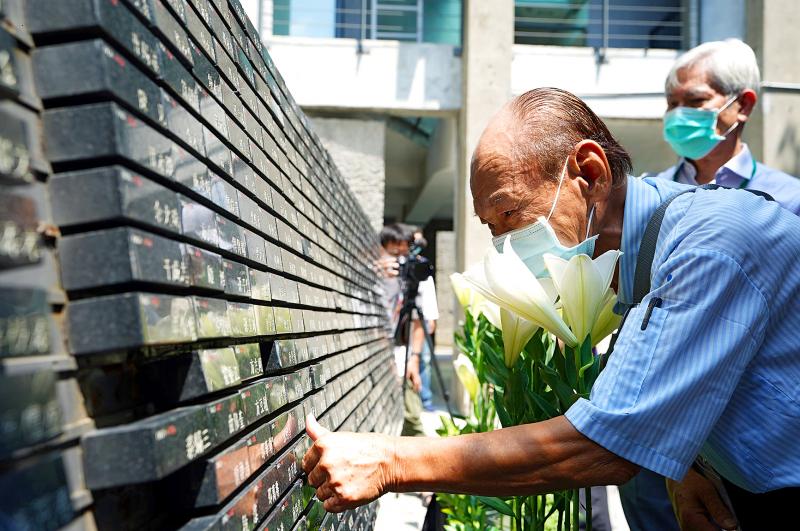The son of a White Terror-era victim, speaking at a memorial event yesterday, said he hoped that Taiwanese would speak up about the era and not forget the previous generation’s sacrifices.
The annual event — which normally takes place the day before the Tomb Sweeping Day holiday and commemorates victims of political persecution — was delayed by the COVID-19 outbreak.
Liao Chih-ping (廖至平), said he was only four years old when his father, Liao Jui-fa (廖瑞發), was arrested during the White Terror era.

Photo provided by the National Human Rights Museum via CNA
“The only image of my father I have in my mind is that of his picture, which was next to his urn in our family living room,” he said.
His family were affected by the accusations leveled against his father even after his father’s death, Liao said, adding that he and other family members were never permitted to talk about his father.
The first time he heard his father being discussed was when his older sister was interviewed last month about the events surrounding their father’s death, he said.
During the interview, his sister talked about going with their mother to identify their father’s body, he said.
Taipei’s National Human Rights Museum invited members of the Taiwan Association for the Care of the Victims of Political Persecution during the Martial Law Period and other non-profit groups yesterday to commemorate family members who were victims of political persecution, and to share their families’ experiences.
Minister of Culture Lee Yung-te (李永得) was unable to attend due to a scheduling conflict with the memorial service of former president Lee Teng-hui (李登輝), but met with the group’s members on Friday and offered his condolences.
Lee said he hoped that the museum would continue its work of uncovering facts about the authoritarian era, and teaching the public about what it finds, so that the era would not be forgotten and history would not be repeated.
Deputy Minister of Culture Kevin Peng (彭俊亨) yesterday said the White Terror era had not only made victims of the roughly 7,000 people whose names are inscribed on the plaque at Taipei’s Jing-Mei White Terror Memorial Park; it also resulted in the destruction of many households.
“Nobody who lived through this history can count themselves as unaffected by it,” he said.

The Grand Hotel Taipei on Saturday confirmed that its information system had been illegally accessed and expressed its deepest apologies for the concern it has caused its customers, adding that the issue is being investigated by the Ministry of Justice Investigation Bureau. The hotel said that on Tuesday last week, it had discovered an external illegal intrusion into its information system. An initial digital forensic investigation confirmed that parts of the system had been accessed, it said, adding that the possibility that some customer data were stolen and leaked could not be ruled out. The actual scope and content of the affected data

‘LIKE-MINDED PARTNER’: Tako van Popta said it would be inappropriate to delay signing the deal with Taiwan because of China, adding he would promote the issue Canadian senators have stressed Taiwan’s importance for international trade and expressed enthusiasm for ensuring the Taiwan-Canada trade cooperation framework agreement is implemented this year. Representative to Canada Harry Tseng (曾厚仁) in an interview with the Central News Agency (CNA) said he was increasingly uneasy about Ottawa’s delays in signing the agreement, especially as Ottawa has warmed toward Beijing. There are “no negotiations left. Not only [is it] initialed, we have three versions of the text ready: English, French and Mandarin,” Tseng said. “That tells you how close we are to the final signature.” Tseng said that he hoped Canadian Prime Minister Mark Carney

POSITIVE DEVELOPMENT: Japan and the US are expected to hold in-depth discussions on Taiwan-related issues during the meeting next month, Japanese sources said The holding of a Japan-US leaders’ meeting ahead of US President Donald Trump’s visit to China is positive news for Taiwan, former Japan-Taiwan Exchange Association representative Hiroyasu Izumi said yesterday. After the Liberal Democratic Party’s landslide victory in Japan’s House of Representatives election, Japanese Prime Minister Sanae Takaichi is scheduled to visit the US next month, where she is to meet with Trump ahead of the US president’s planned visit to China from March 31 to April 2 for a meeting with Chinese President Xi Jinping (習近平). Japan and the US are expected to hold in-depth discussions on Taiwan-related issues during the

President William Lai (賴清德) yesterday bestowed one of Taiwan’s highest honors on Saint Vincent and the Grenadines (SVG) Ambassador Andrea Clare Bowman in recognition of her contributions to bilateral ties. “By conferring the Order of Brilliant Star with Grand Cordon on Ambassador Bowman today, I want to sincerely thank her, on behalf of the Taiwanese people, for her outstanding contribution to deepening diplomatic ties between Taiwan and SVG,” Lai said at a ceremony held at the Presidential Office in Taipei. He noted that Bowman became SVG’s first ambassador to Taiwan in 2019 and